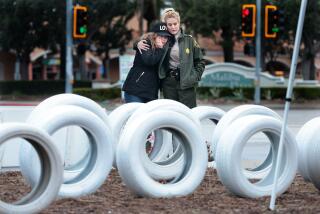House Passes $91.6-Billion Highway Bill
- Share via
WASHINGTON — With funds running out for road-building projects across the nation, the House Wednesday hurriedly passed a $91.6-billion highway and transit financing bill designed to keep the concrete flowing.
At the same time, Western senators and congressmen promised that before the highway debate is over this year, they will push to lift the 55-m.p.h. speed limit on rural interstate routes.
“The momentum for change is just too great to put off any longer. The people won’t obey it, the police can’t enforce it and the need for it has passed,” said Sen. Steven D. Symms (R-Ida.), who opposes the current limit.
Projects Jeopardized
Attention on the five-year highway bill was heightened this year because Congress deadlocked on the issue last fall and jeopardized financing for countless projects. Panicky lobbyists in Washington have warned of dire consequences if federal money is delayed much longer.
A spokesman for the state of California, for instance, said up to 22,000 jobs and $500 million in construction projects will be disrupted if a bill is not signed into law by April 1.
The Reagan Administration, however, announced Wednesday that it is opposed to the House-passed bill as too expensive. In a statement, the White House said the cost should be scaled back to $77 billion or the President’s senior advisers will recommend a veto.
In the Senate, committees are working to finish a draft of its version of the financing bill. A Senate vote is planned tentatively for next week.
Legislation Duplicated
As passed, the House bill would duplicate transit legislation that emerged from the House last year only to die later in a House-Senate conference committee.
It would authorize $91.6 billion for the fiscal years 1987 to 1991--or about $385 in road and transit spending for every man, woman and child in the nation.
For Southern California, the measure, whose sponsors include Rep. Glenn M. Anderson (D-Harbor City), would provide money for major projects such as the Century Freeway, the planned bus or rail lane additions for the Harbor Freeway from downtown Los Angeles to San Pedro, and $870 million to finish the inaugural nine miles of the Los Angeles Metrorail subway.
Also included for the congested Southland are funds to widen approach roads at airports and seaports and $900,000 to improve traffic flow in Orange County, a project that could include a new all-traffic AM radio station to warn of jammed intersections.
Bill Passed 401 to 10
The House bill was passed 401 to 20 under hurry-up rules that prohibited tinkering with the 55-m.p.h. speed limit or any other provisions.
When the Senate takes up the issue, Symms said, he will seek an amendment on raising the speed limit to 65 m.p.h. on long stretches of rural interstates, according to a spokesman for the senator. If successful, that would throw the question to a two-house conference committee.
Last year, the Senate approved a speed-limit increase but the 55-m.p.h. limit survived by a bare 20 votes in the House.
House Speaker Jim Wright (D-Tex.) said recently he hopes a transportation financing bill can be sent to the President quickly, postponing “petty and quarrelsome issues, whatever they be,” such as the 55-m.p.h. debate. House leaders said they want the issue considered separately and have scheduled hearings on the topic for March.
48,000 Lives Saved
Wright credited the lower speed limit with saving 48,000 lives since it was enacted in 1973 as a way to promote fuel conservation. “What price do you put on human life?” he asked.
But since the energy crisis subsided, the speed limit has grown increasingly controversial and is openly flouted along many stretches of uncongested roadways.
Recently, the Reagan Administration joined California Gov. George Deukmejian and leaders of more than 20 other states in signaling support for relaxing the speed limit. Rep. James V. Hansen (R-Utah) urged reluctant members of Congress to get in their cars “and go out on the Beltway tonight. You’ll see that America doesn’t drive 55.”
On the highway financing bill, however, the Administration and Deukmejian are in conflict.
The Republican governor, warning that an additional 15 million motor vehicles are expected to be crowding the California highways by the year 2000, recently undertook a new initiative to expand highway building, in part with federal assistance.
More to Read
Sign up for Essential California
The most important California stories and recommendations in your inbox every morning.
You may occasionally receive promotional content from the Los Angeles Times.










